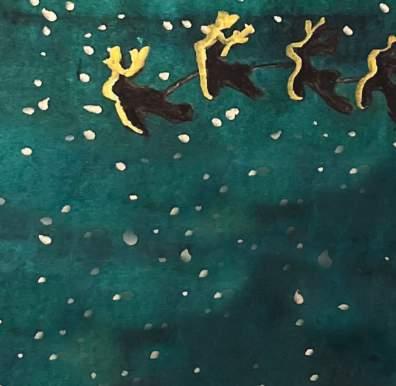




















Another term draws to an end at Warwick School, and what a remarkable term it has been. In early October the Independent School of the Year Awards judges named Warwick School as the Independent Boys School of the Year for 2022. It’s taken over 1100 years, but it seems the rest of the world is finally starting to realise what we have long known, that Warwick School is a truly remarkable community!
The content of this magazine makes it abundantly clear why the school was recognised by the judging panel. As always, The Warwickian gives a taste of what life at Warwick School has to offer and celebrates some of the collective and individual stories of the past 3 months. In the pages that follow you can read about a research trip to Honduras, a rugby tour to Bath, an amazing senior production of Jesus Christ Superstar, speed interviews evening, author visits, and much more, as well as reading the winning Year 9 Independent Essay on the theme of ‘decisions’. The breadth of pupils’ interests and achievements is as always extraordinary, and it is an enormous privilege to lead the community that makes all this possible.
Warwick School is, above all, a community, and for that reason my highlight of this term’s Warwickian is reading about the many contributions to our incredible school experience. From those OWs who returned to school to share their experience through the Encounters programme, to the
parents who have restarted our parents’ association after the hiatus imposed by the pandemic.

The Parents Association of Warwick School (PAWS) officially launched this term, holding its first AGM in September, two uniform sales and hosting the Macmillan Coffee Morning and Big Breakfast. I wanted to take this opportunity to thank the members of the committee and all those who supported these events. PAWS is already starting to further strengthen the links between parents, pupils and school that make Warwick School a very special place.
Thank you as well to all parents, careers and wider family members for your ongoing support I hope you share my sense of pride in our School.
I hope you all enjoy the opportunity for time with family and friends that the holiday presents and wish you all a merry Christmas and happy New Year.
Letter from the Head Master Foundation News

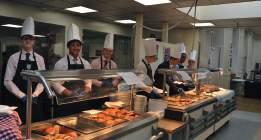
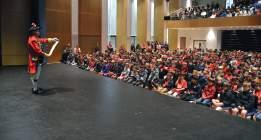
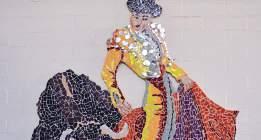
A note from the Principal Learners without borders
The Honduras
James Barker Head Master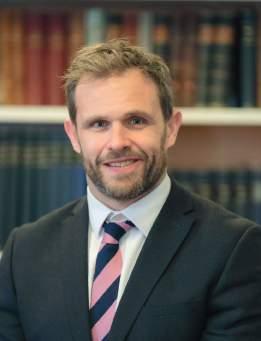
It has been another busy and productive term, with vast amounts to celebrate and reflect on with pride in each of our schools. In particular, Warwick School’s awarding of Boys’ School of the Year is testament to its outstanding provision and restlessness to ensure the very best for our pupils, individually and collectively. A further important development has been the establishment of PAWS, meaning that all our schools now have active and vibrant associations for parents.
When I started playing jazz in Year 7 it was hugely inspiring to see the senior boys in Jazz Lab perform. Jazz Lab rehearsals are not like any other because we really delve deep into the fine details of the music to create the stylistic depiction that the composer wanted. As NCBF comes so early in the school year, preparing the tricky repertoire helps glue the band together for the rest of the year.
Chris (Year 11)
Playing musical instruments and being in a band offers great opportunities for socialisation, teamwork, and development, as well as for developing important musical and mental skills. Playing in a band can also be a fun and rewarding experience, providing a sense of achievement and belonging. This is shown best when bands compete in competitions such as NCBF - it’s fantastic to hear all the music, and it’s fulfilling to represent your school and win. I am grateful for the musical opportunities presented by Warwick and am glad that have taken part in their great Music Scheme and Band opportunities across different genres and levels of music.
Jasper (Year 10)
The Orchestra of the Swan performed ‘From The New World’ in November at Warwick Hall, and Foundation pupils from Warwick School, King’s High School, and The Kingsley School were able to participate in a masterclass to perform one of the pieces from the performance.
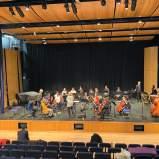


His Majesty’s Lord Lieutenant, Tim Cox, visited the CCF in December in order to present The Queen’s Platinum Jubilee Medal to seven of the CCF staff for their service to the cadet forces. He also took the opportunity to promote some of the cadets and toured the afternoon’s activities, speaking to a large number of cadets. Well done to all those who were promoted or received awards.

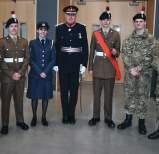
We also say farewell to Andrew Hymer. I would like to pay my own personal tribute to him and thank him for his outstanding leadership of Warwick Junior School over the last seven years. Thousands of children have benefited from his skills and expertise throughout his career, and we wish him a long and happy retirement.
Earlier this year, I wrote to our community about the appointment of a Foundation Director of Safeguarding. I’m delighted to say that Rebecca Jessup joined the Foundation team in September.
Formerly the Education Safeguarding Lead for Dudley Metropolitan Council, Ms Jessup brings significant new skills to our critical safeguarding responsibilities.
We are always looking for how we can find meaningful way for our pupils across our schools to work together - the added benefit of being part of a group of schools. A particular aspect of collaboration we are keen to develop is music. We have recently appointed an Executive Music Lead, who will develop a Foundation music strand, building on the excellent Foundation Orchestra, work with Orchestra of the Swan and other residency programmes, and support our community partnership programmes. As you can imagine, such a unique post generated a great deal of interest and following an exhaustive search process, Stuart Thompson will take up this role in September 2023.
Mr Thompson is currently the Senior Deputy Head at Loughborough High School, having previously been Director of Music at Leeds Cathedral and Caterham School before moving into school leadership. He remains active as a musician, and is an award-winning composer. We look forward to welcoming him to the Foundation.

These two appointments are part of a broader Foundation strategy, which has been developed with
focus groups from across our community - parents, pupils, alumni – as well as staff, senior leaders, and the Governors. It includes a new visual identity for the charity which is our Foundation, and to bring renewed clarity to its purpose: which is, through its schools and educational programmes, ‘enabling transformation through the power of education’. You will see this legend and the new logo complimenting the individual school identities and when the voice is that of the overarching charity, rather than a school. I look forward to sharing the broader strategy with you in more detail in the New Year.
In the meantime, I would like to thank each of you for your support and the trust you place in us for the education of your children.
I wish you all the happiest of Christmases and a peaceful 2023.
My name is Liam, and I’m in Year 9. I play hockey, cricket, and enjoy climbing as well as squash. I am an academic scholar at Warwick School and my favourite subjects are History and Chemistry, and also enjoy languages; I am taking German and French for GCSE and am doing my French GCSE in late 2023 or early 2024. I also do both Ancient Greek and Latin and plan on doing these for GCSE if everything goes well.
Do you already speak another European language?
Yes, I was born in Paris and lived in France for a few years as a child, so speak French quite well.
What is your favourite aspect of learning a new language?
My favourite aspect is probably finding new and interesting vocabulary to learn once I have got the basics. find it refreshing to learn words that I would like to use more often in that language, such as more complicated nouns, verbs, or sentence structures, and just generally enjoy expanding what already know. I also enjoy finding similarities between languages that already know in languages that I am learning, which is very commonplace in Greek, for example.
If you could learn another European language, what would it be?
If I could, I would really like to learn Spanish. While I don’t regret not choosing it in place of German, I think, due to its similarities with French and Latin, it would be quite familiar and easy to learn. I have also always wanted to go to Spain and speaking the language would come in handy.
Hi, my name is James and I’m in Year 10.
If you could learn another European language, which would you choose and why?
If I could learn another modern foreign language would probably learn modern-day Greek, in contrast to ancient Greek, primarily to see the differences in the modern and ancient versions of the language and to further expand my knowledge of that area.
What’s your favourite foreign word and why?
My favourite foreign word would have to be Krankenwagen, purely because of the way it sounds, which in my view is both very funny and satisfying to speak. And the stark contrast to its English counterpart - ambulance.
My name is Atticus, and I’m currently in Year 13.
Do you already speak another European language? What motivated you to learn this language?
The course that have applied to involving law and Spanish law is at Oxford, and involves a year abroad in the 3rd year. The reason I have chosen to apply for this course is that I want to improve my Spanish to the point of fluency and also the fact that it is abroad appeals to me.
How do foreign languages relate to your subject area?
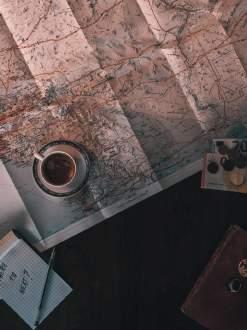
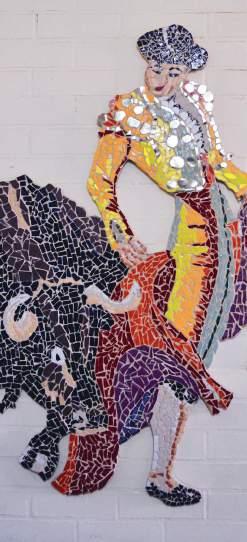
I wanted to learn more about how the Spanish legal system works after learning about the transition to democracy after the death of Franco in 1975, and whether Franco’s legacy in Spain remains.

We spoke to some of our keenest language-learners about their chosen languages, discovering new things, and their aspirations for the future.


The project undertook with Operation Wallacea is a biodiversity research project based in the cloud rainforest in Cusuco National Park, listed as one of the top 50 most irreplaceable biodiversity sites in the world. After training in jungle survival and forest ecology, on arrival assisted with measuring forest structure and carbon content, light trapping for moths and jewel scarab beetles, bird point counts and mist netting surveys, determining Chytrid infection rates within amphibians, spotlight surveys for amphibian distribution, visual transects for bats, and mammal camera trapping.
An old-school American bus pulled up at our hotel at 8.00am. Journeying through Honduras’ biggest city revealed a very different level of development to the usual scenes in England, with the majority of cars lacking number plates or working headlights – some even with people standing on them. Overhead telephone wires were tangled above our heads.
To get up to the rainforest, we rode in the back of a pickup truck for around two hours, through jungle and local villages, where all of the locals from the age of five years old handled 2ft-long machetes. Despite this, they were all welcoming and friendly, teaching us their culture with sign language and very broken English.
The cloud forest base camp was fairly large, which was due to a mining ring that used to be set up in the same area back in the 50s. Many tents were set up already on wooden crates so as to be raised off the ground, so snakes and tarantulas couldn’t get into the tents, and hammocks were set up in the corner.
animal. So got to hold many anoles, which are small lizards with colourful dewlaps on their neck.
These dewlap colours informed us as to their species, and their gender.
In Jungle training, we spent three days hiking, camping in hammocks, and cooking our own food. This training taught us how to put up hammocks, protect ourselves in dangerous situations with certain snakes, and track and navigate towards larger animals.
One conservation technique we used often was mist netting, where we would safely net bats and birds at night and in the morning to then take measurements and mark down the species. These nets were often hard to see at these diminished light hours, and so often enough someone would end up walking into one! However, this feature is perfect for birds and most bats, as birds can’t see it and most bats’ echolocation cannot pick it up until it is too late.
Bats were only handled by professionals using gloves, due to the growing concern of rabies in that area.
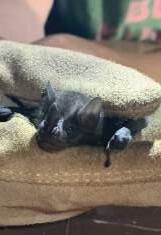


Light trapping was an experience from this trip I will never forget, with simply a bright light the amount of variety in moths you can collect within minutes is insane. Although, it is safe to say that you have to watch out for larger moths when doing this, as it does jump you when one flies into your face due to the head torch.
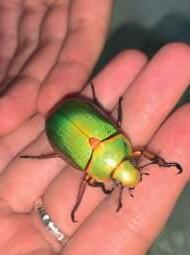




Fraser, Year 13, visited Honduras in the summer to participate in biodiversity research project, Operation Wallacea.
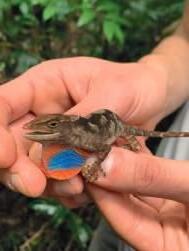
Our schedule was set for each day; coffee at 6.00am, breakfast at 7.00am, luch at 12.30pm, coffee again at 5.00pm, then dinner at 6.00pm. Most of the food I ate there throughout the two weeks was made up of honey, jam, beans, rice and a lot of tortillas. And in between each of these times we’d take part in conservation techniques in which we’d record the species we’d see, take specific measurements, then free them (unless they were certain moths, which we had to send to the British Museum).
One of my favourite segments was the Herp walk, in which we looked for herpetofauna, or more commonly frogs, snakes, salamanders, and lizards. loved this section because it was one of the few times we could safely handle an
My favourite animal saw was either the toucan (which didn’t get a picture of in time), or the jewel scarab beetle. One interesting fact is that they have an organ in their neck that scrambles the bats echolocation so bats cannot hunt them easily.
One part of the trip I will never forget is the people met there, from residents of El Salvador and the Netherlands to as close as Birmingham. Many of these people plan to stay in contact with, and hope to potentially work with them in the future in biology, or more specifically, conservation.
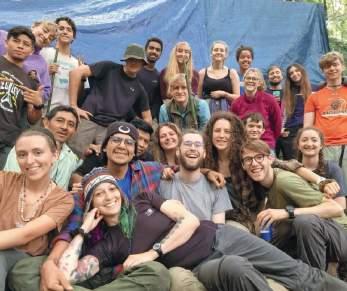
I have always seen myself in the future working within a rainforest or a coral reef doing research and conservation rather than being behind a desk, so this opportunity really means a lot to me as this is my first chance to travel to somewhere outside Europe, and excitingly, my first chance to actually work in a rainforest experiencing what I want to do as a career after university.





Meet the Year 12 mastermind behind the production’s technical and production crews, Matt Dennes.
Summarise JCSS 2022 in only 3 words Powerful. Professional. Spectacular.
Why those three words?
Jesus Christ Superstar was one of Andrew Lloyd Webber’s first major works and was initially unable to secure backing for a stage production when it was published as an album in 1970. It has since become an icon in musical theatre, not least because of it’s incredibly moving, powerful and catchy score. Warwick’s rendition of JCSS (which was last seen on the stage of the Bridge House Theatre almost exactly 10 years ago) was no less spectacular or professional than that of a West End tier production (not my words)! From a thrust stage out into the auditorium in the shape of a cross, to the incredible band made up of Foundation pupils and staff, to this day the quality of productions the Foundation manages to pull off within the time constraints of a school schedule never ceases to astonish me!
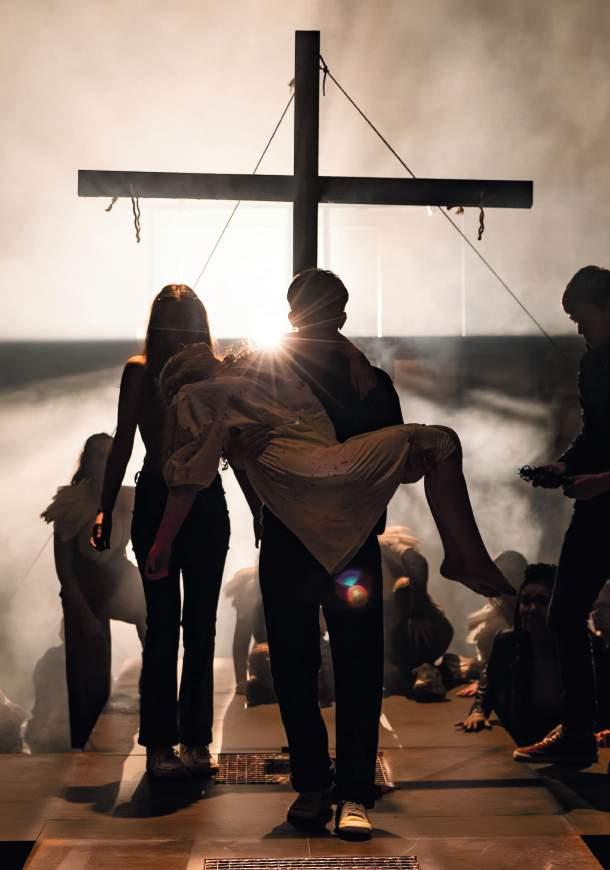
Tell us about your position and what you’ve managed as part of this production was the stage manager for this production. My main responsibility during the production is to ‘call the show’. This means that am reading an annotated script with all the lighting and sound cues (different sound effects or a change in lighting for instance) written where they need to happen. I then speak over the headsets that all the crew have, and the lighting and sound operators execute the cue when I say to. I’m also in charge of coordinating the crew - this includes recruiting them, assigning roles, training and communicating to them when they need to be at rehearsals and any notes the directors or myself have for them (there’s a lot of admin to do!)
What is the first thing you did in your role to prepare for this production?
The first thing I did was to begin to organise the team that would make up the crew for the production. This involves both contacting people who regularly do tech, as well as recruiting new volunteers from both Warwick and King’s. We ended up having a total of 12 crew on this show.
How much support comes from staff and how much is driven by pupils?
It’s a real mix. A lot of the preparation of the theatre is done by staff such as set construction and lighting & sound design and programming; however, during the shows, everything backstage is managed and run by pupils with staff supervising.
What is your favourite element of preparing for a production?
My favourite part in the run-up to the show is the technical rehearsal. It’s a very busy day for the crew as it’s where all the technical aspects like lighting, sound, and in this case, the band, get introduced for the first time. It’s incredibly satisfying to see all the elements come together and to finally start to see the show take shape.
If someone reading has an interest in the production side of theatre, how can they go about getting some experience?
We’re always looking for people to get involved backstage in productions. It doesn’t matter if you’re in your first term of Year 7 (my first show at Warwick was Les Misérables – 2 months into Year 7) or Year 13, nor do you have to take academic drama or have done tech before - all we ask for is an interest and commitment to your role. Possible roles backstage include stage crew, lighting and sound operators, followspot operators, hair and makeup and, of course, stage management.
If you’d like to get involved in a school production, I’d recommend contacting your drama teacher (or Mr Perry directly if you don’t take the subject) soon after a production gets announced, who can put you in touch with either the productions director or stage manager. If you have any general questions regarding tech or want some more info about it, then you’re more than welcome to send me an email or a message on Teams.
“During the shows, everything backstage is managed and run by pupils with staff supervising.”


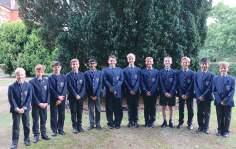
Our new cohort of prefects declared their oath of service to the school in the first assembly of term.
They have already been getting stuck into their duties this term, and we look forward to seeing their continued e orts throughout the year.
Our House Captains started the term by leading assembly, using the time to outline the achievements and qualities of their House figure.
Pupils were encouraged to make a short presentation to their Houses before they voted to determine a local, national, international and environmental charity. Over the course of the year, each House organises a charity day to raise funds and also to generate more awareness of the charity’s work. Last year the pupils raised just short of £4000 - and they hope to better this again in 2022-23!
As always, the pupils rarely make poor decisions and four most worthy charities have been elected:
Drake House: Following Xander’s presentation, the pupils chose his proposed charity, Alzheimer’s Research UK Wellington House: Daniel spoke about the work of the Fair Trade charity, which ultimately won the Wellington vote. Scott House: This year, Scott House will be supporting the World Wildlife Fund, as proposed by Archie.
Nelson House: In a shock tied vote between Helping Hands Community Project proposed by Freddie and The Shakespeare Hospice proposed by Seth on behalf of Oliver (Wellington House), it was decided that money raised over the course of the year will be split between these two charities.

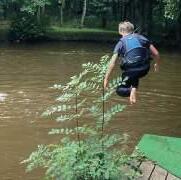
Year 5 had an excellent day at Top Adventure in September enjoying time on the water, caving, problem solving activities and laser tag. It is an ideal day for the boys to spend time in their new forms working together and enjoying each others’ company.
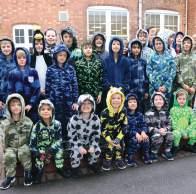
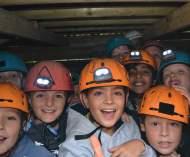

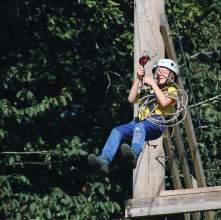
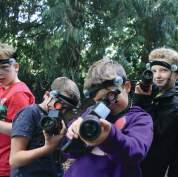

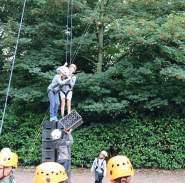
Year 5 pupils from both Warwick Junior School and Warwick Preparatory School shared a day of collaboration centred around art. Pupils were inspired by artwork from Bob and Roberta Smith to create their own colourful letters.

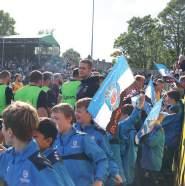
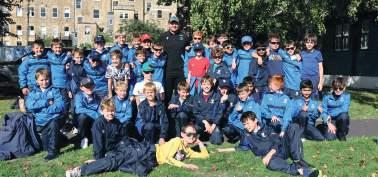
This term, fifteen pupils from Years 4, 5 and 6 had a training day to become AntiBullying Ambassadors, run by The Diana Award Charity. There were 10 other schools being trained, including Warwick Prep School and The Kingsley School.
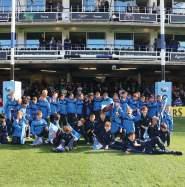
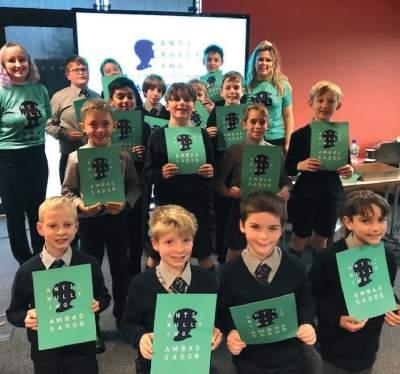
There are 4 badges that Anti-Bullying Ambassadors can earn; the badges are Respect, Wellbeing, Community Action and Online Safety - you can earn these by completing 5 di erent activities with your whole school. These badges are a visual reminder that our team is dedicated to tackling bullying to create a safe and inclusive school for all of us. We are going to work towards our Respect badge.
We all enjoyed the day and learnt lots of things. We are incredibly excited about putting our knowledge into action.
Oren, Safian and Alex (Year 5)
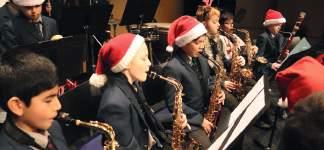
As the first Christmas Concert since before Covid, the boys were so excited to brush o their Santa hats and perform! It was a joy to see so much enthusiasm and festive spirit with only two weeks left until the end of what has been a very busy term!
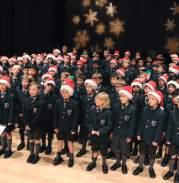
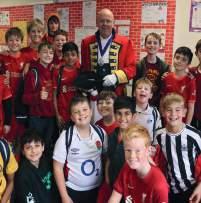
For the first time ever, the time-honoured tradition of the Town Crier visit (to o cially ask the Head Master, on behalf of the Mayor, to grant an extra week of holiday at October Half Term) was held inside due to rain - meaning that all of Junior School were able to raise the roof when the news came that the Town Crier had been successful!
The third running of the Warwick Junior School Aquathlon was held on Saturday, 24 September, with over 100 pupils taking place. The event is all about participation and raising some money for charity. At last count the event has raised over £450, with still more money coming in each day. The final amount will be split evenly between Myton Hospice and the British Heart Foundation.
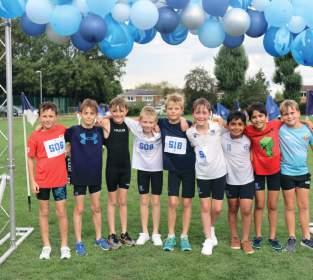

We were very fortunate to host the author Cressida Cowell. Cressida spoke to the pupils about how her experiences spending entire summers on a remote Scottish island helped fire her imagination to write her ‘How to Train a Dragon’ series, and shared many tips and tricks to inspire the writers of tomorrow.
The brilliant Young Shakespeare Company visited in November with their production of Macbeth. Pupils in Years 5 and 6 were immersed in the play as the actors led them through the main scenes whilst introducing characters, helping explain the key moments and language.

As this will be Mr Hymer’s last Warwickian before he retires as Headmaster of the Junior School, we wanted to take the opportunity to thank him for everything he has done over the last seven years and to wish him all the best for the future!
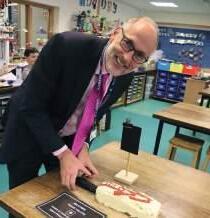
Part 1: Introduction
Life is a path. A progression; a journey; a set of intertwining roadways. It leads us round bends, and into corners, providing both the predictable and the unexpected in every step we take. And, ultimately, we will come to forks in the road. We will have to make decisions, important or insignificant alike. Yet such splits in the path of life beg a complex and near unanswerable question: who is the decision maker? The walker? The path itself? The walker’s equipment, their unique tools and traits that assist their journeying? Or something totally different; abstract; undetectable? Such questions have been the topic of philosophical debate for centuries. In this essay, will present my interpretations and arguments around the idea of “free will,” before justifying my own opinion on the matter: that we are not in control.
Part 2: Key ideas
In order to fully understand the nature of free will, we must first lay down a foundation for our arguments. Here are the central philosophical beliefs, which will refer to throughout this essay:

Determinism
Determinism can be summarised as such: “In philosophy, the doctrine that all events, including human decisions, are completely determined by previously existing causes” . Many famous philosophers (such as Spinoza, Heraclitus, and even Aristotle) have adapted and improved upon the idea of determinism, which, over time, has created a multitude of variations of the concept. However, for the purpose of simplicity, will use it as a term to reference its core principle: that decisions are pre-determined.
Libertarianism
Libertarianism (in free will) is, in essence, just the opposite of determinism, its definition being: “An advocate of the doctrine of free will”2 In other words, the belief that, to some degree, we are able to control and influence both our decisions and, on that basis, our lives.
Now that I have established the groundwork for this essay, I will move on to answer a crucial question: in what sense will be utilising the term “free will”? For, having existed since Ancient Greek times, the philosophy of free will has expanded to a point where it would be difficult to cover it, in its entirety, in a single essay. For this question, will return to my opening paragraph: the comparison of life to a path. And that is what I shall be analysing.
Not how individual decisions are impacted by various natural and environmental factors, but how the progression of life is affected by such factors. A progression that is certainly composed of individual decisions, yet less so defined by them. And this brings me onto my main arguments.
The Anarchy Of Nature: the path, the walker, and the walker’s tools
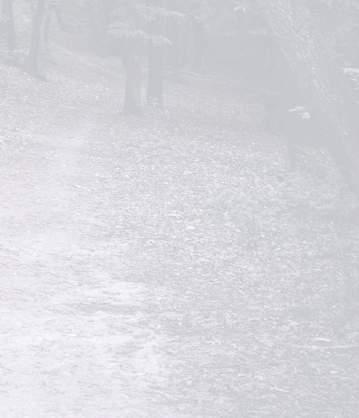
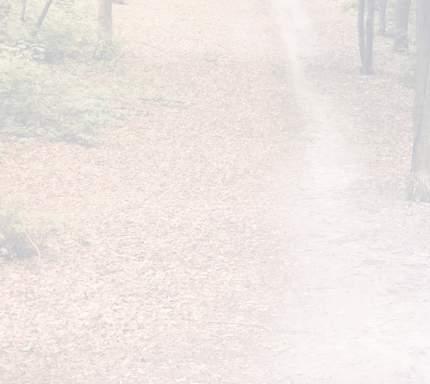
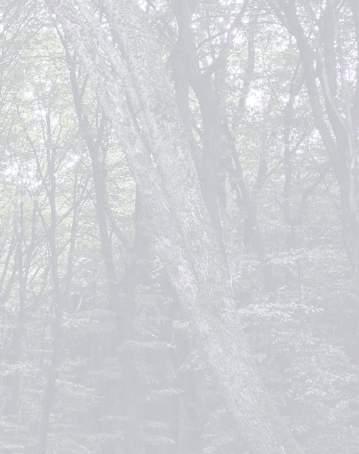


Nature is an anarchy. This is a truth that I must express as swiftly as possible, if my interpretations of free will are to be even remotely valid. To begin with, I must prove this to you, through a single quote, and its meaning:
“The total nature of our world is, on the other hand, to all eternity chaos, not in the sense that necessity is lacking, but in that order, structure, form, beauty, wisdom, and whatever other human aesthetic notions we may have are lacking”-
Friedrich Nietzsche3
Now, Nietzsche’s statement here has been written for a vastly different intention than what I intend to use it for: yet a similar core lies at the centre of each usage. Here, Nietzsche argues that nature is lacking in “human aesthetic notions,” in order to justify the idea of nihilism (the belief that life is purposeless.) Yet, to me, it also displays something different: that nature has no sympathy, nor ethicality, nor logic. Nature’s creation of the walker and the walker’s tools is a process achieved without thought; it more so resembles the roll of a die. Nietzsche does go on to proclaim that there is no chance in nature, but what am grappling with is actually rather separate from the concept of “chance.” To understand this, shall employ an analogy.
Imagine a die. Let us call this die the “die of nature,” for effect. On this die, you have a 1/6 chance of rolling a one. However, for the die of nature, this is an impossibility: in rolling a one, you have both gained and fulfilled a purpose, two things that are not existent within nature. So, we are compelled to alter our die. Now, we shall remove the numbers from the die, to leave it completely white. In doing this, we have discarded the objective goal (the rolling of the one), whilst still retaining a difference in each side (which is the fact that whilst different sides can be rolled, this does not account for an actual purpose.) And, in my opinion, this is how nature operates: it rolls its die, to produce
random results (displayed in personality, and physical attributes), yet its rolling remains totally severed from the idea of “chance” (because the die has fulfilled no objective purpose, in its rolling.) For this reasoning, we can state that the anarchy of nature is perpetually formulating unpredictable results, whilst also fulfilling no purpose. But, more importantly, the anarchy of nature testifies to its name. And we, therefore, cannot control it. Which brings us on to John the psychopath.
John the Psychopath
John the Psychopath is an ideal case study, when we are traversing the ideas of free will. From birth, John had severe ADHD and anger issues. These conditions are John’s tools: yet, in this case, they are unfit for the world we live in. Growing up, John witnessed his father abusing and mistreating his mother, with such terrible actions becoming a normality, within John’s mind. John deeply admired his father, not knowing of his unethical tendencies, and was thereby compelled to follow the path of his father’s immorality. And this brings us onto another aspect of the path.
On the path of life, there are other walkers. There are two ways in which these walkers can impact the path: the “directors” and the “leaders.” A director will suggest an, allegedly, “correct” path, one which must be followed at all costs. At a young age, the influences of a director can be profound. But the latter type of walker is the type that more so applies to John. The leader will follow their own path, without outright telling other walkers to do so themselves. However, if the leader is a significant figure in a person’s life, especially if said person is too naïve to detect the flaws of the leader, they can subconsciously convince that walker to follow their path. John chose to venture down the path of his leader, his father, and the consequences will be harsh.
At the age of four, John was sent to school. His mother brought him into his new classroom, introducing him to his classmates, and left him for the rest of the day. When she returned, John had been taken to the headmaster’s office. Why? He had abused and mistreated another student. From thither forwards, John was unable to attend school, due to his violent habits. The leader had led him astray.
Now we are reaching the climax of John’s story. The neighbourhood that John had been raised in was ridden with crime, crime that was displayed before John’s very eyes. Ergo, John was desensitised to evil itself: criminality was no longer so abhorrent, in his eyes. So, rather predictably, John himself treated committing a crime far too lightly. This is an example of the aesthetic of the path itself determining the destination, a common determinist argument. The environment, culture, and area, that John was accustomed to, deeply affected John’s morality and thought process, to the point where John himself was no longer in control of such things.
Finally, the terrible conclusion to the path of an afflicted man. John, at the age of twenty, was walking through his city, at night, when he encountered a young child. The silhouette of John’s hulking form terrified the child, causing them to screech, at a violent pitch. Almost immediately, the police detected the incident, and, when they came to the site of the screaming, they found John, holding the dead body of the child.
What can we learn from John?
John, in his rage, has mistakenly murdered a child. Now, we must answer the question: what caused John to act in such a way? And this is where we can truly reap the rewards of our
path analogy.
The tools. John, intrinsically, was impulsive. Anger issues, ADHD, and a general pattern of acting prior to thinking, were enormous contributors to John’s individual decision to kill the child. The aesthetic of the path. John’s path was ridden with violence: he quickly underwent a process I would call “total moral desensitisation,” where the actions a person has been exposed to totally desensitises them to immorality. In this scenario, the person becomes “unethical,” simply due to the fact that they have been exposed to an unethical environment, which, blatantly, is not something they are able to control.
The leader. As stated earlier, John’s role model, his father, was a promoter of enmity and savagery. Thus, in following his father’s path, John adopted such undesirable attributes.
And where does the actual walker fit into this equation? Almost nowhere. John, in himself, simply existed, with these exterior factors influencing him. Now he has been sent to prison, with a full life sentence. His path has met a dead end and, eventually, John’s will, his energy and supplies, are depleted. He finishes his own life, no longer able to withstand his perpetual torment. And even that was not his own decision for, had John’s path been pleasant and beauteous, he would not have chosen to stop walking.
The argument outlined above takes a determinist perspective, on the matter. Yet how would someone who believes in free will respond to this? And how can our argument persist, through this response?
A common example of libertarian thought would place focus upon John: firstly, the libertarian would discard the ADHD and impulsivity. These are aspects of John’s character, in the libertarian’s opinion, and thus classify as parts of the walker, rather than the walker’s tools. With this, our opposition would move to the individual decision of killing the girl, stating that John chose to murder her, a choice made by the character of John, even if said character was represented by medical disorders (for even if they are disorderly, the ADHD and impulsivity are just extremes of John’s nature, extremes that have been labelled.) Ergo, the girl’s death was within John’s control.
Obviously, this counter-argument disregards the aesthetic of the path, and the leader, in favour of considering what John could have done, to prevent the event from occurring. But, even with the disappearance of our tools from the path, the wall of natural influences established earlier remains solidly in place. To prove this, we should redesign John’s life, to test different outcomes. John is born into a wealthy family; he still has his ADHD and other conditions; his family care for him; he is properly educated. Is the girl still dead? No. Because, in spite of the conditions, John’s education, and new-found morality, would despise the idea of violence or abuse. In the moment, John’s environmentally created qualities would have overpowered his desires, and halted his attack upon the girl.
Conclusion
We have now pondered the question: “are we in control?” With the suggestions I have put forward, I am willing to conclude that we are not. The die of nature; the path; the tools; the leader; the path’s aesthetic; they have power over our lives. Yet, even so, this is not to say that pleasantry cannot be experienced, in the lengthy walk of life. You simply have to find enjoyment, even if you, yourself, are unable to cause it.



In October we held our annual Mock Speed Interviews for Year 13 pupils. Top employers from all over the country gave their time to put the pupils through their paces.

Each student participated in three 15-minute interviews. The evening provides participants with experience of an authentic interview situation, practice of answering interview questions, and an opportunity to develop confidence in what can be a stressful situation.
Employers are selected from our alumni network, including former Old Warwickians, who have had successful careers in engineering, law, medicine, armed services, science, business, and many more industries. Warwick pupils engaged with top employers and discovered what it takes to be successful in the world of work.
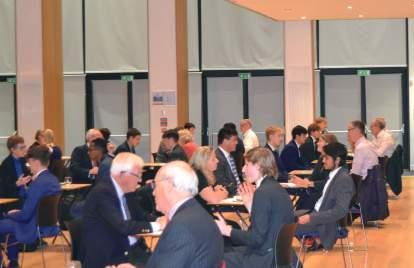
The Speed Interviews were such a useful experience to be able to imitate the environment of a realworld interview. I am hoping to study aeronautical engineering, so to be given the opportunity to meet professionals within the industry was an invaluable experience. There were many aspects that will also take away from it from ensuring that your CV is the best it can be in gaining an initial impression of you to learning how to prepare before an interview to be ready for frequently asked questions.
Samuel, Year 13Mr. Tapper Gray recommended this evening to me due to my struggles in past interviews. So, quickly wrote a CV and signed myself up to attend. The night offered free exposure to the job market that I would have to go through after/during university. This was also my first time in an interview for something am passionate about. The evening consisted of three interviews where I got a chance to show off my passions while being given a taste of what questions get asked in interviews and I was given expert tips on my CV. I got the chance to try out new things, without any negative effects if they didn’t work. The experience was extremely useful, and I would recommend it to anyone nervous about interviews or looking to improve their CV.
James, Year 13




The Independent Schools of the Year awards are designed to highlight the extraordinary student experience that the UK’s top independent schools provide, whilst also showcasing and celebrating their individual successes.


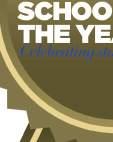


On Tuesday, 11 October the Head Master and Dr Chapman travelled to London for the awards ceremony. This year’s winners were chosen from over 700 nominations across 22 awards categories and, to our delight, the judges named Warwick School as Independent Boy’s School of the Year for 2022.

The judges cited Warwick School’s ability to combine pride in its long history and the traditional values we hold with an innovative approach that prepared pupils not only to achieve outstanding outcomes in public examinations but to go on to enjoy successful careers and happy fulfilled lives.
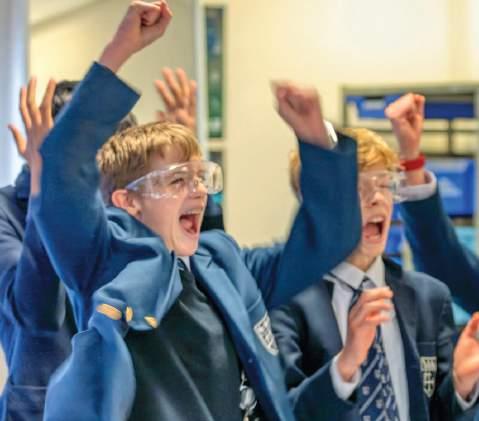
They praised initiatives like the Wellbeing Hub, which offers a safe space and access to wellbeing professional for all pupils at any time of the day. The development of a Design Thinking curriculum was also highly praised, given the importance of such skills in the world of work today. The introduction of the Warwick Diploma encourages pupil participation in opportunities beyond the classroom, and ensure reflection on the impact these experiences have on their person development.
All of these programmes and more were highlighted as part of a curriculum tailored to best suit the way most boys, specifically, learn. To receive this prestigious award is a real cause for celebration and pride for the entire school community.
Our whole community celebrated after Warwick School was recognised as Independent Boys School of the Year at the Independent Schools Of The Year Awards 2022.
The Parents Association of Warwick School (PAWS) is officially up and running! After the hiatus imposed by the Covid pandemic, it’s great to have the group established and already building the links between parents, pupils and the schools.








We have hit the ground running, holding our first AGM on Monday, 11 September at which co-chairs and a secretary were elected for both the junior and senior PAWS groups, before a lively and useful discussion on the plans for the coming months.
A group to help manage and run the second hand uniform sales, which will be for both junior and senior schools, was also established.
We held our first uniform sale earlier on in the Michaelmas Term and it was very well attended. We are grateful to those parents who turned up both to buy and to help, but also to those who donated garments. An incredible £2,100 was raised on the day. It is anticipated there will be at least one sale per term from now on which will be for both junior and senior schools, and it’s hoped from next year, we will be able to give parents a percentage of the amount each garment is sold for.
The second sale took place on Saturday, 3 December, so a huge thank you to those who donated items or helped on the day!
Our second joint venture was the Foundation-wide Macmillan Coffee Morning and Big Breakfast, which took place in the Pyne Room and Dining Hall on Friday, 30 September. Parents, pupils, and teachers tucked in to a delicious array of sausage or bacon rolls, pastries, tea and coffee or juice, with veggie and vegan options also on offer.
It was great to see so many of our amazing prefects and Sixth Formers (see above photo!) helping out behind the counters serving both food and drinks, as well as helping to clear away and tidy up the plates and cups. A big thank you to all of them for their hard work. They are a real credit to the school.
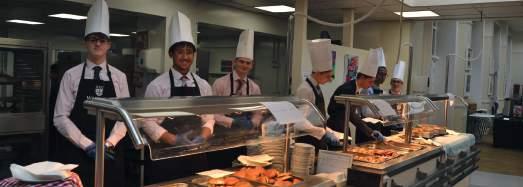
We would also like to thank all the parents and boys who made cakes and other sweet treats which were sold on the morning. It all helped to raise a fantastic £1,370.
Following the success of the Macmillan Coffee Morning, there was also a Mince Pie and Mulled Wine afternoon which parents and children from across the Foundation were invited.
Keep your eyes peeled for information about forthcoming PAWS events - we hope to advertise them in good time with communications sent out via the weekly newsletters and the PAWS email.

If you would like to get in touch, help out at any of the events, or want more information, please email us at warwickschoolpaws@gmail.com as we’d be delighted to hear from you.
The Old Warwickian Association currently has 6,300 members worldwide. Warwick School’s Alumni Relations team builds and sustains strong relations with our OWs through an annual programme of communications, events, reunions and sport. The Old Warwickian magazine, which is sent out twice a year to OWs, is available for all to read online at www. oldwarwickians. org/oldwarwickian The magazine highlights recent and forthcoming events and activities, celebrates Old Warwickian news and includes dedicated features on such things as OW pilots and Warwick School archives.
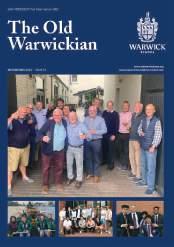

The CCF Corps of Drums was a prominent and popular feature of Warwick School life throughout the 20th century, involving many cadets who participated in school and civic events, such as the annual Remembrance Day commemorations.
A group of Old Warwickians, led by former Chair of Governors David Stevens and former OW Association Chairman Nigel Robinson, have contributed to an appeal to raise funds for new instruments and equipment. At time of writing, the appeal is over halfway towards its target and we hope to launch the new Corps of Drums for cadets in the CCF before the end of the academic year.
For further information and updates on progress, visit www.oldwarwickians.org/corpsofdrums


We are continually grateful to OWs who support the school through talks, visits and careers support. This term’s OW visitors included Ameet Gill OBE, David Cameron’s former speech writer who spoke as part of our Friday afternoon Encounters series and Owen James, former Welsh Guard who served in Afghanistan, who spoke at our Remembrance Service.
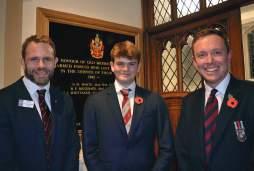
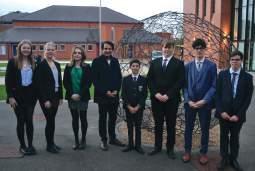




Award-winning and best-selling author and illustrator Thomas Taylor visited us in September to lead a series of creative workshops for Year 8.
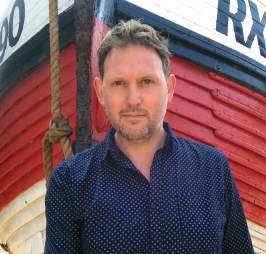
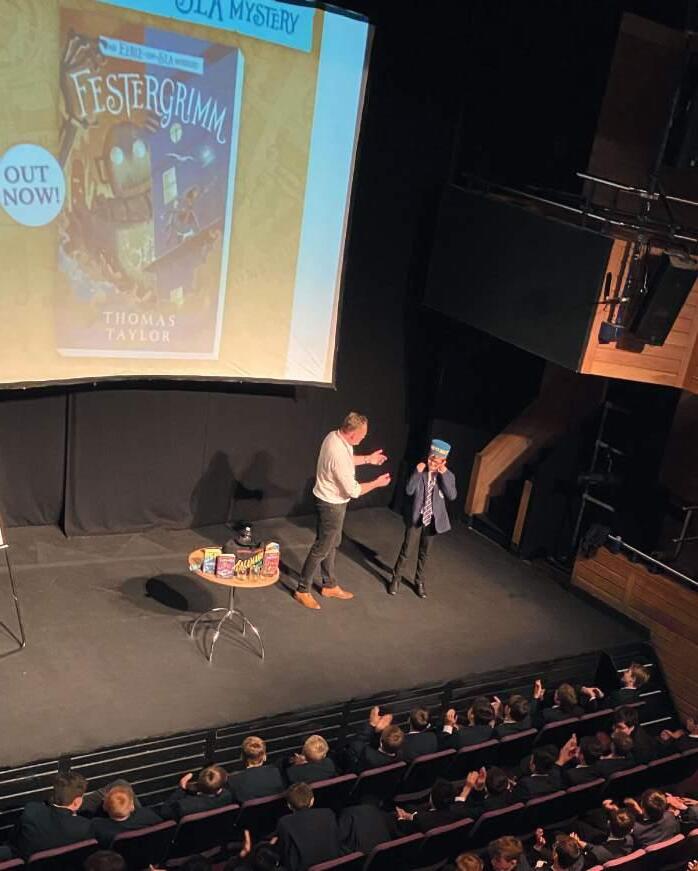
What was your favourite subject at school?
Art. I loved to draw, even when should have been doing something else.
Were you given any good advice that helped you be where you are today?
was very much encouraged to draw a lot, and told that practice was the only way to improve. brought that belief to my writing later. And to everything.
And what advice would you give Warwick pupils after your visit?
If you aspire to write then the best advice I can give would be to start! Don’t wait too long like I did— get going.
But then, having started, the second piece of advice I would give is to get it finished. Half a story isn’t a story at all. So start writing, make sure you finish your stories, and you will find you teach yourselves how to write in between.
What does a typical day look like as an author and illustrator?
I start with walking my dog on the beach, and maybe finding something interesting on the way — a fossil or seaglass or an intriguing piece of driftwood.
Then home to work, which, if writing, will mostly do in the morning. In the afternoon I do my illustration work and then admin to end the day. Then I walk on the beach again.
Do you have any book recommendations for Warwick pupils?
Oddity by Eli Brown (this book follows Clover Elkin, the nononsense daughter of a frontier surgeon as she tries to protect the secret magical object). And finally, if you could visit one fictional place for a day, where would you go?
221b Baker Street. I’d love to meet Sherlock Holmes and Dr Watson, and maybe accompany them on a case.
“If you aspire to write then the best advice I can give would be to start! Don’t wait too long like I did— get going.”
Community











Will, Year 11
Max, Year 3



We asked our pupils for their best submissions for this year’s Christmas card, and we were so impressed with the quality and variety of the response we got!
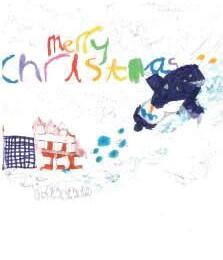

Our overall winner Harry (Year 7), chosen by Mr Barker, had his design used as Warwick Senior School’s official Christmas card for 2022, and won a £15 book token.
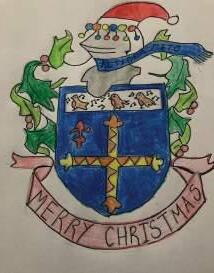

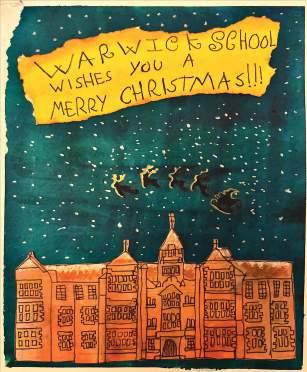
Congratulations also to our Junior School winner, Finn (Year 4). Well done and thank you to all who submitted, it was a very tight competition!

I used watercolour paints of various shades of blue and green for the background, and brown, orange and yellow for the building. I printed a photo of the school and traced a rough outline onto my

watercolour paper which I then went over with pen. I really enjoyed this project and hope you like my entry.
- Harry, Year 7

Warwick School and the Warwick Schools Foundation prides itself on the production of healthy and wholesome meals all produced by our extremely talented in-house catering teams.
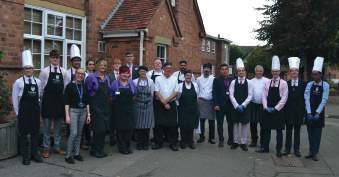
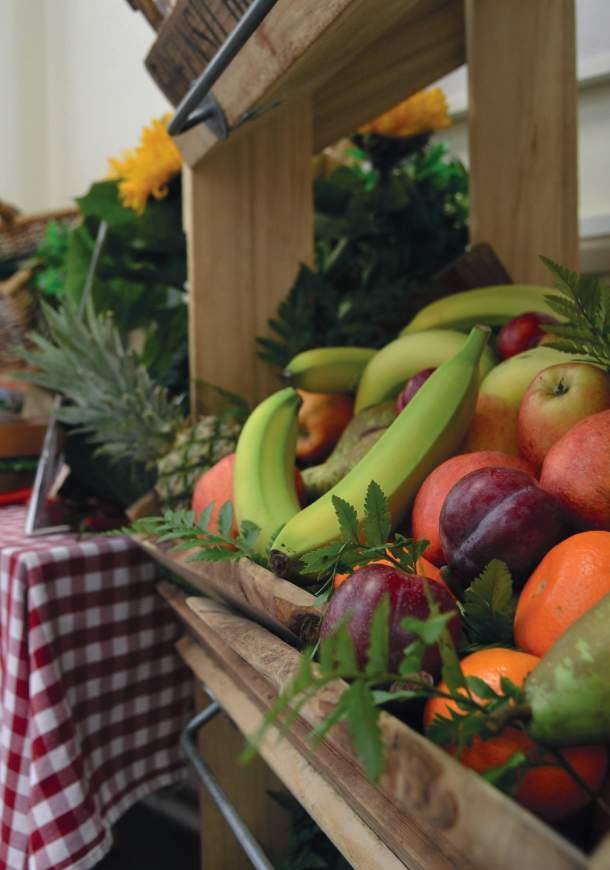
Our mission is to ensure no pupil goes hungry and we are always happy to work closely with any pupils with specific dietary needs, whether that is gluten free, vegan, halal or in some cases just preferring a plain meal offer.
All of our meals are produced fresh daily by our highly skilled in-house teams, using locally-sourced seasonal produce as much as possible.
We are always looking at how we can develop our food offering and keep it ontrend with professional industry standards and expectations. Myself and Executive Head Chef Bernie Enghaldrt regularly meet with the Warwick School Catering Committee (this page, bottom right). The committee is made up of pupils from all year groups and headed up by a prefect, Atticus. It’s a fantastic group of engaged and excited pupils that has prompted real change. The feedback we receive allows us to adjust our menus and our production to ensure that all pupils are having a healthy balanced diet.
Since the beginning of the academic year, with the support of the Catering Committee, the following changes have been made to the Warwick School’s catering offer:
• Pupils have been encouraged to ask for bigger portions of carbohydrates and vegetables if they are feeling hungry - this enables us to help reduce food waste and protect our planet by not overloading plates
• Revised sandwich filling options to make sure there are more firm favourites that appeal to all year groups
• Half portions at Tuck Shop (where appropriate)
• Better selection of vegetarian and vegan options
• Change of menu wording to be more inclusive
• New state-of-the-art juice machines dispensing sugar-free flavoured water - so far the favourite is watermelon, by a mile!
• Themed menus that pupils are involved with choosing and decorating dining room - most recently was International Languages Day, where a range of continental treats were served up

• The pupils also recently helped to serve breakfast at the Macmillian Big Breakfast event, serving pastries, hot sandwiches, coffee, tea, and orange juice (this page, middle right) - you can see the prefects and catering team pictures together above! We think the chef hats really make the boys look the part!
We also make a conscious effort to source from local suppliers. For example, all of our meat comes from our local butcher, The Artisan Butcher, based in Warwick town centre.
And we’re not done yet! We will continue to provide updates and improvements to our services, so watch this space for more catering news in the future!
Our catering team work hard to feed over 1500 pupils and staff each and every day...and that’s just at Warwick School!
With one eye always on quality, our Foundation Head of Food Operations, Mr Badr, explains the efforts the catering department continue to make to collect, listen to, and respond to pupil feedback.



Two of our sporting captains took time out of their busy schedules, both inside and outside the classroom, to give their view on the season so far.
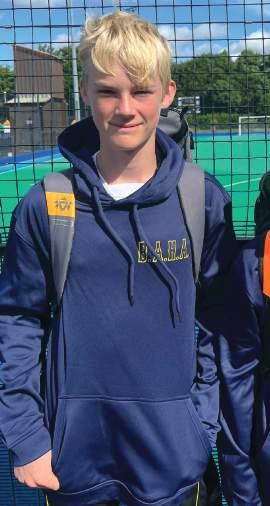
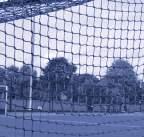
The term has started strong for our school swimming team with our main gala being qualifiers for ESSA - the premier school swimming competition. Our senior team qualified in 10th and 19th place for the freestyle and medley relays respectively; our intermediate team qualified in 6th and 9th place for the two relays - these are impressive national rankings and improvements on last year’s performance.
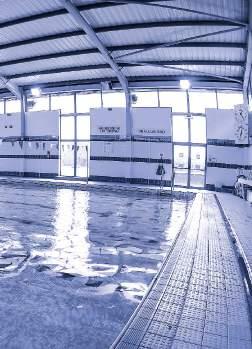
The team members have done very well individually with one of our swimmers taking 2 gold medals in the open category at the West Midlands Championships - making himself the fastest 18 year old ever in the region. Our other members setting countless new personal bests has been very encouraging to see.
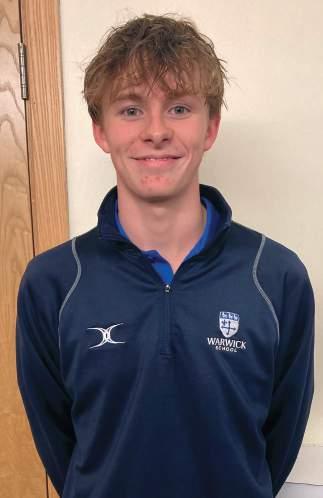


Our teams have achieved some of the best results in the school history this season and we hope to keep the positive momentum going into the rest of the school year.
Louis, Year 13, swim team captain

We have gotten off to a great start to the season, we have lost a few games but overall, our performances were good as we have started to get to grips with each other and our playing styles. The team is shaping up and we are all growing individually and learning new skills. I’m looking forward to the rest of the season and seeing the boys grow even more.




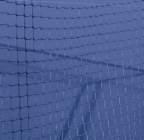
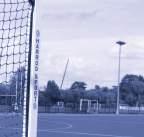

Barney, Year 8, U13A hockey captain







